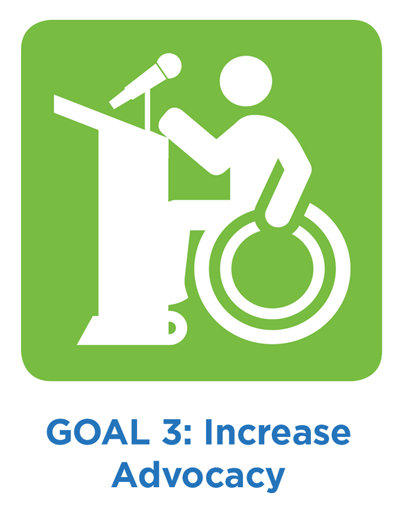NC ADA Network Coordination, Technical Assistance & Fiscal Intermediary
![]() The NC ADA Network supports grassroots groups, led by people with disabilities, to conduct projects that promote voluntary compliance with the Americans with Disabilities Act (ADA) in their local communities. The Fiscal Intermediary provides timely, accurate reimbursement for the funding of Network Affiliate Group ADA initiatives and participant travel/training expenses.
The NC ADA Network supports grassroots groups, led by people with disabilities, to conduct projects that promote voluntary compliance with the Americans with Disabilities Act (ADA) in their local communities. The Fiscal Intermediary provides timely, accurate reimbursement for the funding of Network Affiliate Group ADA initiatives and participant travel/training expenses.
Why is NCCDD funding this initiative?
- Approximately 19% of the non-institutionalized population report having a disability.
- Persons with disabilities are twice as likely as those without disabilities to be unemployed, have inadequate transportation or go without medical care.
- The federal Americans with Disabilities Act (ADA) signed in 1990 stemmed from a growing recognition that policies, societal barriers and prejudices were key factors in producing these outcomes.
- The ADA prohibits discrimination and guarantees that people with disabilities have the same opportunities as everyone else to participate in the mainstream of American life – to enjoy employment opportunities, to purchase goods and services, and to participate in State and local government programs and services.
- This initiative supports NCCDD's Goal 3 of the current Five Year Plan: Increase advocacy for individuals with I/DD.
What are the major goals and objectives?
- In order for individuals to benefit from the provisions offered in the ADA, federal, state and local entities must effectively implement and put these laws into practice.
- The ADA National Network consists of 10 regional centers and an ADA Knowledge Translation Center distributed throughout the US to provide local assistance and foster implementation of the ADA.
- The North Carolina ADA Network is a collaborative initiative of the Southeast ADA Center and the North Carolina Council on Developmental Disabilities (NCCDD).
What has taken place since the start of the program? (Activities)
- ADA technical assistance to businesses, service providers, individuals with disabilities and families including accessibility consultation, referral, ADA information, local and state advisory board membership, etc. (NC ADA Network local groups receive priority when contacting the Southeast ADA Center for advise on providing ADA technical assistance.)
- ADA education and training including local in-person training, webinars, audio-conferences and web courses.
- Dissemination of ADA materials and publications with accurate, up-to-date information about the ADA.
- Public awareness activities that increase ADA awareness and knowledge (including exhibits, presentations and media).
What has been achieved to date?
- Over 23 local grassroots groups, led by people with disabilities, from across North Carolina are active members of the NC ADA Network.
- In 2014, these groups conducted or hosted Americans with Disabilities Act (ADA) projects and activities in 44 counties across the State.
- In the past year 2017 the NC ADA Network has conducted educational and technical assistance activities that include:
- 25 ADA trainings serving 707 people (254 people with disabilities, 80 family members and 373 business representatives)
- 1801 ADA publications to 1209 people
- ADA technical assistance to 819 people (343 people with disabilities, 82 family members and 394 business representatives)
- 10 public awareness events, including ADA exhibits and presentations, reaching more than 300 people - Development of state and local partnerships to implement the provisions of the ADA.
What long-term changes are expected as a result of this initiative?
- Build a network of hundreds of community leaders who can advocate for greater accessibility and inclusion, and can train others in their local communities to make improvements that support individuals with disabilities.
- Integrate leaders into each community who are regularly called upon as a resource for improvements in disability policy.
- Shift attitudes and expectations with respect to the contributions individuals with disabilities can and do make as employees in our workplaces and engaging in our cities and towns.
Multiple local community projects across the State have addressed accessibility and transportation, how can I get involved?
Contact Karen Hamilton, NC ADA Network Coordinator, [email protected]
Who can I contact for questions?
Coordinator: Karen Hamilton, NC ADA Network Coordinator, [email protected] or 336-314-3503
NCCDD: Melissa Swartz, Systems Change Manager, [email protected] or 919.518.9525
Additional Resources
Read about North Carolina's Celebration of the 30th Anniversary of the ADA in 2020.
Read about North Carolina's Celebration of the 29th Anniversary of the ADA in 2019.
Read about North Carolina's Celebration of the 28th Anniversary of the ADA in 2018.
Click here to read The ADA Network in North Carolina: A report created in recognition of the 25th Anniversary of the signing of the Americans with Disabilities Act (ADA), May 2015
Americans with Disabilities Act: Starting the Conversation with a Business: A Leader’s Guide: https://www.adasoutheast.org/publications/business-guide/ada-conversation.pdf This was created by the NC ADA Network in collaboration with the Southeast ADA Center.